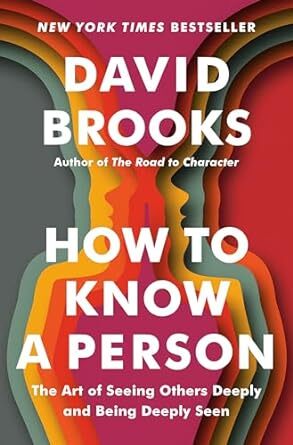How to Know a Person—and See them with Jesus’s Eyes
As we gather here, cupped hands warming around steaming mugs, hearts seeking light, David Brooks whispers truths about “Illuminators” — those who see every face as a mirror of Jesus. Illuminators are souls who look past the surface and greet each person with a reverence that speaks of our shared essence as children of God. In a world that feels heavy, Brooks’s words in How to Know a Person offer a featherlight touch of grace: “If you consider that each person has a soul, you will be aware that each person has some transcendent spark inside them.”
Here, on this quiet corner of the internet, let’s sit with that thought, that each of us carries a spark equal in worth, shimmering with potential. It’s a joy to welcome David to the farm’s porch today…
Guest Post by David Brooks
A few years ago, I was in Waco, Texas. I was there to interview Weavers, the kind of community builders who knit towns and neighborhoods together. It’s not hard to find such people.
You simply go to a place and ask residents, “Who is trusted around here? Who makes this place run?”
In Waco, a number of people told me about a ninety-three-year-old Black woman named LaRue Dorsey. I reached out, and we arranged to get together over breakfast at a diner. She’d spent her career mostly as a teacher.
Every journalist has their own interviewing style. Some reporters are seducers.. Some are transactionalists. Their interviews are implicit bargains.. Others are simply delightful, magnetic personalities. My mode, I suppose, is that of a student. I ask people to teach me things. I generally don’t get too personal.
That morning, Mrs. Dorsey presented herself to me as a stern, drill sergeant type, a woman, she wanted me to know, who was tough. “I loved my students enough to discipline them,” she told me. I was a bit intimidated by her.
In the middle of the meal, a mutual friend named Jimmy Dorrell entered the diner. Jimmy is a teddy-bearish white man in his sixties who built a church for homeless people under a highway overpass, who leads a homeless shelter by his house, who serves the poor. He and Mrs. Dorsey had worked together on various community projects over the years.
He saw her across the room and came up to our table smiling as broadly as it is possible for a human face to smile. Then he grabbed her by the shoulders and shook her way harder than you should ever shake a ninety-three-year-old. He leaned in, inches from her face, and cried out in a voice that filled the whole place: “Mrs. Dorsey! Mrs. Dorsey! You’re the best! You’re the best! I love you! I love you!”







I’ve never seen a person’s whole aspect transformed so suddenly. The old, stern disciplinarian face she’d put on under my gaze vanished, and a joyous, delighted nine-year-old girl appeared. By projecting a different quality of attention, Jimmy called forth a different version of her. Jimmy is an Illuminator.
“A person who is looking for beauty is likely to find wonders, while a person looking for threats will find danger.“
At that moment, I began to fully appreciate the power of attention. Each of us has a characteristic way of showing up in the world, a physical and mental presence that sets a tone for how people interact with us. Some people walk into a room with an expression that is warm and embracing; others walk in looking cool and closed up. Some people first encounter others with a gaze that is generous and loving; other people regard those they meet with a formal and aloof gaze.
That gaze, that first sight, represents a posture toward the world. A person who is looking for beauty is likely to find wonders, while a person looking for threats will find danger. A person who beams warmth will brings out the glowing sides of the people she meets, while a person who conveys formality can meet the same people and find them stiff and detached.
“Attention,” the psychiatrist Iain McGilchrist writes, “is a moral act: it creates, brings aspects of things into being.” The quality of your life depends quite a bit on the quality of attention you project out onto the world.
The moral of my Waco story, then, is that you should attend to people more like Jimmy and less like me.
Now, you may think this is an unfair comparison. Jimmy had known Mrs. Larue for years. Of course he was going to be more familiar with her than I was going to be. Jimmy has a big, boisterous personality. If I tried to greet people the way Jimmy does, it would feel fake.
“He is trying to see them with Jesus’s eyes—eyes that lavish love on the meek and the lowly, the marginalized and those in pain, and on every living person. “
But the point I’m trying to make is more profound than that. Jimmy is a pastor.
When Jimmy sees a person—any person—he is seeing a creature who was made in the image of God.
As he looks into each face, he is looking, at least a bit, into the face of God.
When Jimmy sees a person, any person, he is also seeing a creature endowed with an immortal soul—a soul of infinite value and dignity.
When Jimmy greets a person, he is also trying to live up to one of the great callings of his faith: He is trying to see that person the way Jesus would see that person. He is trying to see them with Jesus’s eyes—eyes that lavish love on the meek and the lowly, the marginalized and those in pain, and on every living person.
When Jimmy sees a person, he comes in with the belief that this person is so important that Jesus was willing to die for their sake. As a result, Jimmy is going to greet people with respect and reverence. That’s how he’s always greeted me.







This posture of respect and reverence, this awareness of the infinite dignity of each person you meet, is a precondition for seeing people well.
Wherever you’re at with God right now, I ask you to deeply consider the concept of a soul. You may just be chatting with someone about the weather, but I ask you to assume that the person in front of you contains some piece of themselves that has no weight, size, color, or shape yet gives them infinite value and dignity.
If you consider that each person has a soul, you will be aware that each person has some transcendent spark inside them. We’re not equal in might, intelligence, or wealth, but we are all equal on the level of our souls.
If you can attend to people in this way, you’ll be offering a gaze that says, “I’m going to trust you, before you trust me.” Being an Illuminator is a way of being with other people, a style of presence, an ethical ideal.

How to Know a Person is a practical, heartfelt guide to the art of truly knowing another person in order to foster deeper connections at home, at work, and throughout our lives—and to find the joy in being seen.
Let us all strive to be Illuminators, seeing the humanity of everyone we meet, and remembering what we share: Jesus was willing to die for us, and God made us in His image.
David Brooks is one of the nation’s leading writers and commentators. He is an op-ed columnist for The New York Times, a writer for The Atlantic, and appears regularly on PBS Newshour. He is the bestselling author of The Second Mountain, The Road to Character, The Social Animal, Bobos in Paradise, and On Paradise Drive.
{ Our humble thanks to Random House for their partnership in today’s devotional.}
Ann Voskamp's Blog
- Ann Voskamp's profile
- 1368 followers



